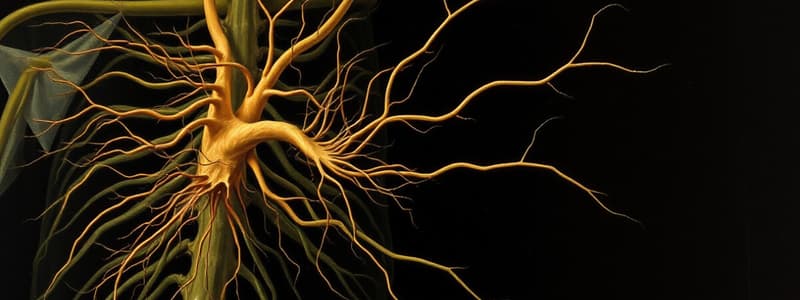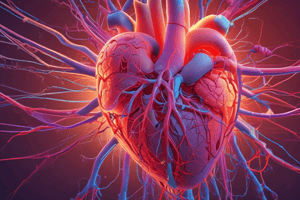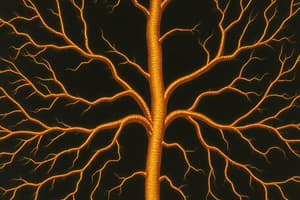Podcast
Questions and Answers
What is the primary reason for the different effects observed in organs from sympathetic and parasympathetic innervation?
What is the primary reason for the different effects observed in organs from sympathetic and parasympathetic innervation?
- Different muscle types innervated
- Differing nerve pathways for signal transmission
- Varied blood supply to organs
- Different neurotransmitters and receptor types (correct)
Which of the following pairs correctly identifies the effect of the sympathetic and parasympathetic nervous systems on the heart?
Which of the following pairs correctly identifies the effect of the sympathetic and parasympathetic nervous systems on the heart?
- Both decrease heart rate and force
- Both increase heart rate and force
- Parasympathetic decreases heart rate; sympathetic increases heart rate and force (correct)
- Parasympathetic leads to increased heart rate; sympathetic decreases heart force
What is the effect of the sympathetic nervous system on the gastrointestinal tract?
What is the effect of the sympathetic nervous system on the gastrointestinal tract?
- No effect on gastrointestinal function
- No effect on peristalsis but increases secretion
- Decreases peristalsis and inhibits secretion (correct)
- Increases peristalsis and secretion
How does the sympathetic nervous system affect blood vessels, excluding skeletal muscle?
How does the sympathetic nervous system affect blood vessels, excluding skeletal muscle?
Which of the following statements correctly describes the effects of the parasympathetic division on salivary gland secretion?
Which of the following statements correctly describes the effects of the parasympathetic division on salivary gland secretion?
Which adrenergic receptor subtype is primarily responsible for stimulating the heart?
Which adrenergic receptor subtype is primarily responsible for stimulating the heart?
Which subtype of adrenergic receptor is primarily associated with smooth muscle relaxation?
Which subtype of adrenergic receptor is primarily associated with smooth muscle relaxation?
Which adrenergic receptor subtype is found on presynaptic adrenergic nerve terminals?
Which adrenergic receptor subtype is found on presynaptic adrenergic nerve terminals?
Which adrenergic receptor subtype is predominantly expressed in lipocytes?
Which adrenergic receptor subtype is predominantly expressed in lipocytes?
Which adrenergic receptor subtype is NOT primarily involved in central nervous system functions?
Which adrenergic receptor subtype is NOT primarily involved in central nervous system functions?
What role do neurotransmitters play in neural communication?
What role do neurotransmitters play in neural communication?
Which neurotransmitter is predominantly associated with the somatic nervous system?
Which neurotransmitter is predominantly associated with the somatic nervous system?
In the autonomic nervous system, which neurotransmitter is involved in sweat gland regulation?
In the autonomic nervous system, which neurotransmitter is involved in sweat gland regulation?
Which neurotransmitter is released by the autonomic nervous system to affect heart rate in the sympathetic division?
Which neurotransmitter is released by the autonomic nervous system to affect heart rate in the sympathetic division?
Which of the following statements accurately describes the location and arrangement of prevertebral ganglia?
Which of the following statements accurately describes the location and arrangement of prevertebral ganglia?
What is the primary target for acetylcholine (ACh) in the parasympathetic nervous system?
What is the primary target for acetylcholine (ACh) in the parasympathetic nervous system?
What function is typically associated with postganglionic fibers that travel along blood vessels?
What function is typically associated with postganglionic fibers that travel along blood vessels?
Which cranial nerve is associated with innervation of the ciliary body and iris smooth muscle?
Which cranial nerve is associated with innervation of the ciliary body and iris smooth muscle?
What neurotransmitter is primarily released by postganglionic neurons in the parasympathetic division?
What neurotransmitter is primarily released by postganglionic neurons in the parasympathetic division?
Which structure is specifically mentioned as not being segmentally arranged?
Which structure is specifically mentioned as not being segmentally arranged?
What regions do the preganglionic neurons of the parasympathetic division originate from?
What regions do the preganglionic neurons of the parasympathetic division originate from?
What is the primary role of the splanchnic nerves that emerge from S2-S4?
What is the primary role of the splanchnic nerves that emerge from S2-S4?
Which cranial nerve is primarily responsible for innervating the parotid gland?
Which cranial nerve is primarily responsible for innervating the parotid gland?
Which type of cholinergic receptor demonstrates a strong affinity to nicotine?
Which type of cholinergic receptor demonstrates a strong affinity to nicotine?
What is the primary function of M2 muscarinic receptors?
What is the primary function of M2 muscarinic receptors?
Where are M3 muscarinic receptors primarily located?
Where are M3 muscarinic receptors primarily located?
What distinguishes muscarinic receptors from nicotinic receptors in terms of affinity to muscarine?
What distinguishes muscarinic receptors from nicotinic receptors in terms of affinity to muscarine?
Which statement about peripheral cholinergic receptors is correct?
Which statement about peripheral cholinergic receptors is correct?
Which receptor type is associated with the autonomic ganglia and has strong affinity?
Which receptor type is associated with the autonomic ganglia and has strong affinity?
Which receptor has a presynaptic function within the CNS?
Which receptor has a presynaptic function within the CNS?
What is the primary distinction between the binding affinities of muscarinic and nicotinic receptors?
What is the primary distinction between the binding affinities of muscarinic and nicotinic receptors?
Flashcards are hidden until you start studying
Study Notes
The Sympathetic Ganglion
- Paravertebral ganglia are located parallel to the spinal cord, connected to spinal nerves via grey and white rami.
- Prevertebral ganglia are unpaired, anterior to the vertebral column, and found only in the abdomen and pelvis; also known as collateral ganglia.
- Postganglionic fibers are categorized into three types: those entering spinal nerve through grey ramus, those traveling along blood vessels to innervate head and neck, and fibers from collateral ganglia innervating visceral organs.
Parasympathetic Division
- Preganglionic neurons originate from the brainstem and lateral horn of the spinal cord (S2-S4).
- Effected through cranial nerves III, VII, IX, X and sacral nerves, synapsing in terminal ganglia, where they release acetylcholine (Ach).
- Postganglionic neurons also release Ach after a short distance from terminal ganglia.
Cranial Outflow
- Oculomotor nerve (III) originates in the midbrain, synapsing in the ciliary ganglion, targeting the iris and ciliary body.
- Facial nerve (VII) fibers arise in the pons, synapsing in pterygopalatine and submandibular ganglia to innervate lacrimal, salivary, and mucous glands.
- Glossopharyngeal nerve (IX) arises from the medulla oblongata, synapsing in the otic ganglion, with the target organ being the parotid gland.
- Vagus nerve (X) comes from the medulla and synapses in various terminal ganglia, innervating the heart, lungs, gastrointestinal tract, liver, and pancreas.
Sacral Outflow
- Sacral outflow emerges from S2-S4, forming splanchnic nerves.
- Responsible for innervation of the lower half of the large intestine, rectum, urinary bladder, and reproductive organs.
Dual Innervations of ANS
- The autonomic nervous system consists of sympathetic and parasympathetic divisions, which often innervate the same organs but produce opposing effects.
- Different neurotransmitters and receptor types explain the variances in physiological responses.
Neurotransmitter Overview
- Neurotransmitters are chemical messengers that traverse synaptic gaps between neurons to initiate responses in target cells.
- Sympathetic neurotransmitters include acetylcholine (ACh) and norepinephrine (NE) with different effects on target organs.
- The parasympathetic system predominantly uses ACh at both preganglionic and postganglionic synapses.
Cholinergic Receptors
- Muscarinic receptors have a strong affinity to muscarine and are located on parasympathetic effectors, such as exocrine glands and smooth muscles.
- Nicotinic receptors are found at autonomic ganglia and neuromuscular junctions with a strong affinity to nicotine.
Adrenergic Receptors
- Divided into alpha (α) and beta (β) subtypes, alpha receptors (α1, α2) are primarily found in smooth muscles and presynaptic terminals.
- Beta receptors (β1, β2, β3) function in various organs: β1 mainly in the heart, β2 in smooth muscles, and β3 in adipocytes.
Studying That Suits You
Use AI to generate personalized quizzes and flashcards to suit your learning preferences.



